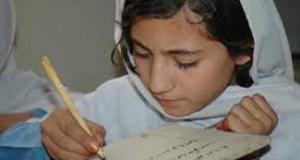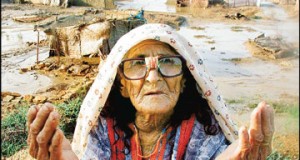The Reko-Diq area is known to be the part of Tethyan Magmatic arc, which Contains wealth of large copper –gold ore deposit of varying grades. Reko-Diq area is one of many eroded remnant volcanic centers in the Chaghi, which runs in an east and west line across Balochistan between Quetta to Taftan railway and the border with Afghanistan.
The Reko-Diq reserves were discovered in 1978. According to the Geological Survey of Pakistan the Reko-Diq is famous because of its vast Gold and Copper Deposits and it is believed to be world’s 5th largest gold mines. The minerals resourc at Reko-Diq is estimated at 5.9 billion tones with an average copper grade of 0.41 percent and an average gold grade of 0.22g/tones. These minerals resources lie in the Chaghi area of Pakistan’s southwest Balochistan province – bigger than those evaluated at Sarcheshmeh in Iran and Escondido in Chile. However, the experts estimate that only a small part of the Reko Diq gold and copper mines (EL-5) have deposits worth US $270 billion.
In 1993 an agreement reached between the government of Balochistan and mining company BHP Billiton and established a joint project with the only interest of Balochistan , at 25 percent and BHP at 75 percent in June 2000.
The TCC, had an alliance with BHP Billiton .In April 2006, it assumed all rights and obligations of BHP under the Chagai Hills Joint Venture Agreement (CHEJVA). Thus Reko-Diq was then jointly owned by Antofagasta with 37.5 percent .Barrick Gold with 37.5 percent and Balochistan with 25 percent stake. At first the deal was done with BHP, but BHP sold its interests to TCC and latter sold it to Barrick Gold and Antofagasta. According to the TCC the company had spent $400 million on exploration and technical studies 2006.
According to the TCC the Reko Diq Mining Project was a US$ 3.3 billion investment project that promised to build and operate a world class copper-gold open-pit mine in the northwest area of Balochistan, where the project was planned to have an estimated mine life of 56 years. The annual production of the TCC Reko Diq project was estimated at 200,000 tons of copper and 250,000 ounces of gold from 600,000 tons of concentrate. In order to achieve this production rate approximately 110,000 tons of ore was aimed to be processed daily.
In August 2010, the TCC completed the feasibility study in respect of the project and submitted that to the government of Balochistan. Earlier report TCC completed an extensive exploration program at Reko Diq with more than 300,000 meters drilling comprising mainly diamond and reverse circulation drilling. The Feasibility Report was based on extensive world class engineering, technical and financial studies .The report named Environmental and Social Impact Assessment (ESIA) was submitted to further make ways for negotiations with the Government of Balochistan and Federal Government of Pakistan for future investment in the project.
On 15 November 2011, TCC was informed by the government of Balochistan that the government had rejected its application for mining lease .TCC began two international arbitration in order to protect its legal right. The TCC lost the cases in International Chamber of Commerce International Court of Arbitration (ICCICA) and in International Center for Settlement of Investment Disputed (ICSID) against government of Balochistan.
The court’s decision weakened the TCC’s case in the international tribunal as Chagai Hills Exploration Joint Venture Agreement (CHEJVA) was declared void, which means that TCC had no rights to claim under the 1993 agreement in the international court. The apex court in its ruling said that the agreement reached on July 23, 1993 was in conflict with the laws of the country.
The supreme court of Pakistan had already declared the contract illogical with TCC that the company did not have any right over Reko-Diq. Finally on 10th May 2013 it appeared in media that Tethyan Copper Company (TCC) abandoned project.
According to the Dr. Samar Mubarakmand the provincial government will implement the project. Now the government plans to launch project herself. Under the project, as many as 15,000 tonnes of raw material, worth $411 million, would be excavated annually and the provincial government would earn an annual profit of $321 million from it. “The provincial government had allocated Rs1, 400 million for the project, whereas the water supply for it would only cost Rs1, 980 million and would be completed within one-and-a-half year.” says Dr. Samar Mubarakmand.
The Reko-Diq project had proposed ancillary infrastructure development projects for future such as: 1) Power plant for mining for considerable amount of electricity in the area.2) The underground pipeline of 682 Km from Reko-Diq connecting to Gawadar port .3) Development of facilities for dewatering and pressure filters.4) Coverage belt arrangement and ship-loader.5) Project village in the area with all the basic facilities of life. But in last twenty years the TCC and government of Balochistan even remained unable to provide clean drinking water to the communities in the area.
The motto behind explaining comprehensive tale of Reko-Diq project is to mention the richness of the Balochistan in natural resources and the exploitation of these worth billions deposits by Islamabad and its so-called governments in Balochistan. Though Balochistan has importance in region because of its wealth in minerals, these resources have not been utilized sincerely to bring economic growth in Balochistan.
If we keep in view the estimated deposits and their international value so out of hundreds of natural resources only the Reko-Diq resources are enough to bring a gigantic development change in all the walks of life in Balochistan. Unluckily, Islamabad is only interested in plundering Baloch resources with the help of so-called Baloch representatives in provincial and national assembly and bureaucracy.
Now the government of Balochistan or plainly the Islamabad has planned to run Reko-Diq project itself, still, there is no assurance that the people in Balochistan will be benefited or not. Yet it is claimed that the local people of Balochistan will be recruited for the project’s non-technical positions and project offices to be established in Quetta instead of Islamabad.
Concisely, the bitter familiarity with deprivation of no opportunities in other projects such as Gawadar, Sandak, in industries of Hub and Lasbelah and Sui Gas has already created despondency among the youth in Balochistan. No project in Balochistan can be thriving and advantageous unless the real representatives of Balochistan are included in decision making with international guarantees. Otherwise Balochistan will always remain deprived of its rights and resources.
Bibliography:
- Reko Diq: Controversial project and mining contracts by Muhammad Daheem
- The Reko Diq saga by Syed Fazl-e-Haider
- The Reko Diq Project By TCC
- Secret negotiations on Reko Diq with caretakers this week by Shaheen Sehbai
- Reko Diq project exploiting own treasures by Khalid A Khokhar
 Balochistan Point Voice of Nation
Balochistan Point Voice of Nation




